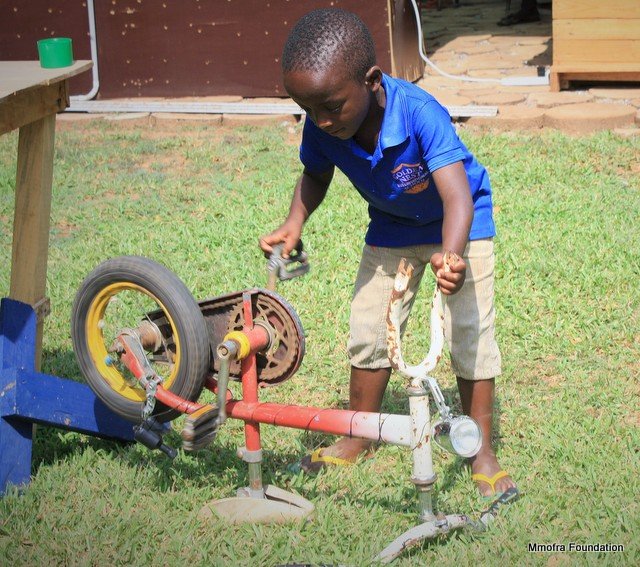Interviewee: Amowi Phillips
Interviewers: Giulia Gualtieri, Cynthia Wamkota and Rose Munene
December 2021
Mmofra Foundation
AMOWI PHILLIPS
Alongside professions in higher education and legal consulting, Amowi is a social innovator and international coordinator with the Ghana-based CSO Mmofra Foundation, leading many of its child-centred initiatives in play, culture and design in African contexts. An advocate for accessible public cultural spaces in urban Africa, she is on the World Urban Parks Committee on Children, Play & Nature, and is a promoter of an Africa Play Network of Africa-based play innovators as well as a curator of the Conscious Accra Festival.
“Play is often not perceived as a process of learning in the same way that formal classroom education is. Part of our mission at Mmofra is to free up the conception of formal learning. We want to demonstrate the many different ways in which children and youth can thrive physically and cognitively in open green spaces.”
HOW was mmofra foundation born?
Mmofra Foundation begins with my mother, Efua Sutherland, a writer, educator and cultural activist during the independence era in Ghana. In 1961, she co-authored a photo essay called Playtime in Africa, which had images of children at play in diverse urban and rural environments accompanied by prose poems. She also established a children's park system for Ghana when she chaired Ghana's National Commission on Children. This trajectory led to founding this organization. Mmofra means “children” in the Akan language.
The foundation advocates for playful environments for children. We champion child-friendly placemaking not just in Ghana but in African cities in general, reframing and redesigning spaces to be welcoming to children of ages 0 to 15 years. Our approach is inclusive and interactive; it is about both physical and conceptual spaces in which we recognize children as part of society.
We functioned without a formal space for several years until we were able to steward a one and a half-acre children's park in Accra. This provided a live green lab to experiment with outdoor learning spaces through child-centred programming. Besides being a play space, it's been an idea incubator, a maker space, an outdoor classroom, an exhibition space, and a community gathering site. Ideally, it functions at multiple levels and has been shaped by children, artists, teachers, parents, traditional knowledge experts, designers working with different materials and people from all walks of life.
What do you think are the main difficulties that children have to face in the streets of accra?
Notably, the urban environment isn't driven enough by policies around well conceptualized and well-managed public spaces. Policymakers and municipal authorities often tend not to think in creative, aware, and culturally sensitive ways. This is a big issue because these spaces could actually reflect children's needs and be much more friendly.
Children are natural place makers; they will play in any environment. In Ghana, however, we haven't allowed them to confidently occupy their cities or move safely within them and express themselves without real danger of serious injury.
Ironically, this is the case even though children and young people are the majority of the population. For instance, when travelling around Accra, you'll find children walking and playing by the roadside with no proper sidewalks or pavements. Air quality is a real issue because of vehicle traffic and there are other environmental dangers like open drains, holes on the road, unprotected gutters.
Who are the champions you identify in Ghana within your field?
I see encouraging innovations in the arts and culture space, especially in urban Ghana. The Foundation for Contemporary Art blends art into child-friendly environments. The Osu Children's Library Fund embeds wonderful libraries and programmes in Accra's communities. Ibrahim Mahama, founder of Red Clay Arts and Cultural Space and Savannah Centre of Contemporary Arts in Tamale, Northern Ghana, repurposes old aircraft as discovery spaces and exposes children to world-class visual art, material culture experiences and play, all for free. I believe all these are invaluable ways to foster curiosity and confidence.
We want to thank Amowi for her passion and activist dedication to promote more inclusive and just cities and create more child-friendly environments in Ghana.
Thank you for sharing YOUR STORY WITH THE HUASIPICHANGA COMMUNITY!







